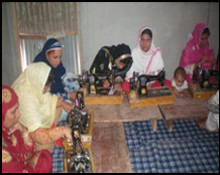 Women's vocational training center
Women's vocational training center
The basic development needs (BDN) programme was launched in Nowshera in Pakistan in 1995. The programme is based on the principle that health cannot be achieved without improving the overall quality of life, necessitating the adoption of a holistic approach to health.
The BDN programme is now working in nine districts across the country:
Dadu and Jamshoro (Sindh)
Mastung (Balochistan)
Multan and Kasur (Punjab)
Muzaffarabad and Neelam (Azad Kashmir)
Nowshera (North West Frontier Province)
Peshawar FR (Provincially Administered Tribal Areas).
The implementation sites in each district were identified in coordination with provincial and district governments.
Community organization and action
Intersectoral teams are formed in each BDN site, representing departments of health, education, agriculture, environment and local government, to technically support the initiatives. Each village selects a village development committee and organizes itself into a number of clusters for which cluster representatives are identified.
Using community and public sector inputs, small scale social projects are implemented in the areas of health and nutrition, education, water and sanitation, and women’s development, along with income generating schemes. The projects are planned, co-financed and managed by the community.
To improve local governance, efforts are made to enhance managerial capacities in target setting, formulating strategies, proposal writing, mobilizing resources, accounting, and monitoring progress and evaluating outcomes. During planning workshops, new social and income generating projects are presented and reviewed for joint funding by the community, government, BDN revolving fund, WHO and other interested developmental partners.
Programme sites
The BDN programme currently covers a population of 1.73 million and population coverage is being rapidly expanded in all districts. At the end of 2008, in the nine BDN districts, there were 154 480 community representatives (13 662 male and 1818 female), 731 village development committees, 127 nongovernmental and civil society organizations working on health-related issues, 107 community citizen boards, 15 health committees, 26 women’s organizations and 58 youth groups.
Achievements
The current health and development indicators in BDN areas tend to be far more favourable than the national indicators.
Significant achievements so far include:
Health
64 basic health units/rural health centres and 19 maternal and child health centres strengthened;
12 community-based maternal and child health centres established;
148 de-worming campaigns conducted covering 65 655 school children;
164 health promotion campaigns undertaken;
1472 lady health workers trained on the BDN concept and process and 768 on immunization, malaria, tuberculosis, and maternal, neonatal and child health
1477 women health volunteers trained in home health care, including nutrition and growth monitoring skills, and provided with weighing scales and growth monitoring charts
130 traditional birth attendants trained.
Women’s development
74 women’s vocational training centres established through community co-financing and 22 632 women trained in various skills;
15 000 adult women taught basic literacy;
160 000 mothers and 22 000 women’s vocational training centre students trained on home health care and participatory skills.
Primary education and adult literacy
2930 primary schools active in BDN areas;
37 adult literacy centres established and basic literacy imparted to over 51 926 adults, mostly women (47 810).
Basic development needs programme




